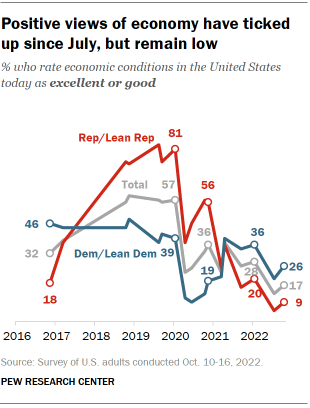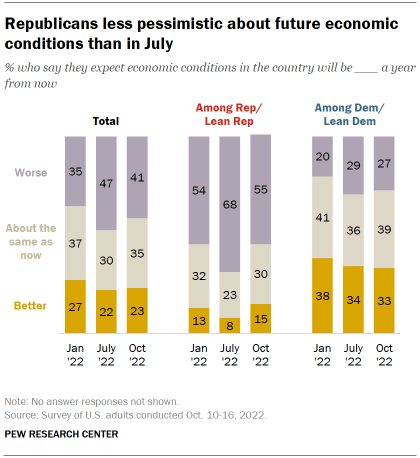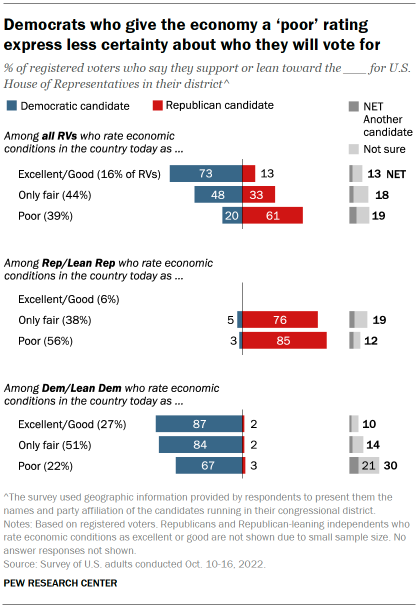Americans’ views of the nation’s economy remain overwhelmingly negative, with roughly eight-in-ten adults (82%) saying that economic conditions today are poor (36%) or only fair (46%). Fewer than two-in-ten (17%) say that conditions are excellent (2%) or good (16%).

Ratings of the economy have improved since July, when 49% described conditions as poor and 13% described them as excellent or good. Yet ratings remain lower than they were in January of this year, when 28% rated economic conditions as excellent or good.
Both Republicans and Democrats express more negative views of the economy than they did in January.
Today, just 9% of Republicans and Republican-leaning independents rate conditions as excellent or good, compared with 20% who said this at the beginning of the year. And about a quarter of Democrats and Democratic leaners (26%) currently rate conditions positively, compared with 36% in January.
Americans continue to be more likely to express pessimistic views of the economy than optimistic views. About four-in-ten (41%) say they expect economic conditions to be worse a year from now than they are today, compared with 23% who expect conditions to be better in a year and 35% who expect them to be about the same.

As with views of current economic conditions, the public’s expectations for the economy are more positive than they were in July, but more negative than in January.
Republicans account for most of the change in expectations. While a majority of Republicans (55%) expect economic conditions to worsen over the next year, this share is down 13 percentage points since July – and almost identical to the 54% of Republicans who expressed pessimistic views of the economy at the beginning of the year. The share of Republicans who say economic conditions will be better a year from now is roughly double the share who said this three months ago (15% now vs. 8% in July).
Democrats remain more optimistic than Republicans about future economic conditions. A third expect economic conditions to improve over the next year, which has changed only modestly since January (38% then vs. 33% now).

The public’s concerns about the economy – like views about current and future economic conditions – reflect partisan differences. Republicans express more concern than Democrats about five of the seven economic issues included in the survey.
While majorities in both parties say they are very concerned about the price of food and consumer goods and the price of gasoline and energy, Republicans are much more likely to say they are very concerned: Republicans are 22 points more likely than Democrats to say they are very concerned about the price of gas and energy and 15 points more likely to say this about the price of food and consumer goods.
Republicans are also more likely than Democrats to be very concerned about the limited availability of some consumer products (43% vs. 31%), employers being unable to find workers for hire (41% vs. 27%) and how the stock market is performing (43% vs. 24%).
By contrast, Democrats are somewhat more likely than Republicans to be very concerned about the cost of housing (62% vs. 57%) and people who want to work being unable to find jobs (33% vs. 25%).
Views of the economy and midterm voting
Voters’ views of current economic conditions are closely related to their candidate preferences: those who rate the economy as poor are roughly four times as likely to favor a Republican candidate for the U.S. House of Representatives as those who rate the economy as excellent or good (61% vs. 13%).

The large gap in partisans’ assessments of the economy – with Democrats rating conditions more positively than Republicans – explains a substantial portion of this relationship, though there are differences within each party.
More than eight-in-ten Democrats who rate economic conditions as excellent or good (87%) or only fair (84%) also say they support a Democratic candidate for the House. Among the 22% of Democrats who rate economic conditions as poor, a smaller majority (67%) support a Democratic candidate.
Even among Democrats with very negative evaluations of the economy, hardly any (just 3%) say they support a Republican candidate for the House. But 30% of Democrats who say conditions are poor also say they will vote for a candidate from another party or that they aren’t sure who they will vote for, compared with 14% of those who rate the economy as only fair and 10% of those who rate it excellent or good.
Among Republicans, those who rate the economy as poor are 9 percentage points more likely to say they support a Republican candidate – and 7 points less likely to favor a third-party candidate or say they aren’t sure who they will vote for – than those who rate the economy as only fair. Very few Republicans (6%) have positive views of the economy.


